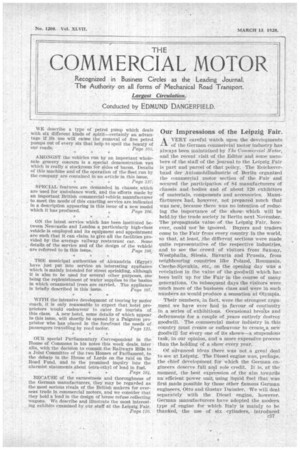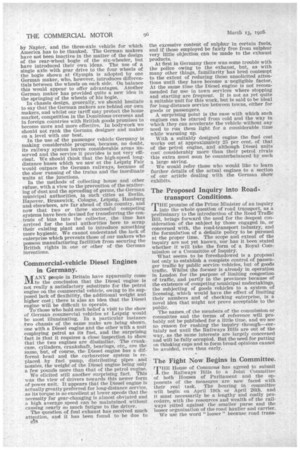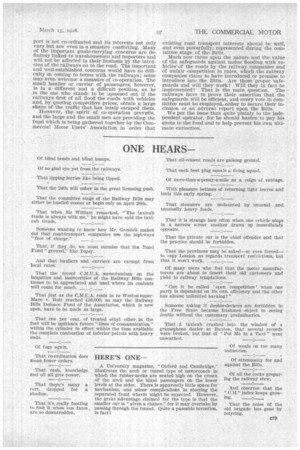Our Impressions of the Leipzig Fair.
Page 47

Page 48

Page 49

If you've noticed an error in this article please click here to report it so we can fix it.
AVERY Careful watch upon the developinents. of the German commercial motor industry has always been maintained by The Commercial Motor, and the recent yisit of the Editor and some members. of the staff of the journal to the Leipzig Fair is part and parcel of that policy. The Reichsverbaud der Autoniobilindustrie of Berlin organized the commercial . motor section of the Fair and secured the participation of 84 manufacturersof chassis and bodies and of about 120 exhibitors of materials, components and accessories. Manufacturers had, . however, not prepared much that was new, because there was no intention of redueing the importance of the show which will be held by the trade society in Berlin next November. The propaganda value of the Leipzig Fair, however, could not be ignored. Buyers and traders come to the Fair from every country in the world, so that, at least, _the different sections were made quite representative of the respective industries, and to see. the crowd of visitors from Saxony, Westphalia, Silesia, Bavaria and Prussia, from neighbouring countries like Poland, Roumania, Czecho-Skovakia, etc., on the opening day was a revelation in the value of the goodwill which has been built up for the Fair in the course of many gerteratrons. On Subsequent days the visitors were much more of .the business class and were in such numbers as Would produce a sensation at Olympia.
Their numbers, in fact, were the strongest argument we -have ever had in favour of continuity -in a series of exhibitions. decasional breaks and deferments for a couple of years entirely destroy goodwill. The commercial motor indastry in this country must create or endeavour to create, a, new goodwill for every one of its shows—a stupendous task, in our opinion, and a more expensive process than the holding Of a show every year.
Of advanced Ideas there. was not a great ,deal to see at Leipzig. The Diesel engine was, perhaps, the .chief development for 'which the German engineers deserve full and sole, credit. If is,. at the moment, the best expression of the aim towards an efficient power unit, using liquid fuel that was first made possible by those other famous German engineers, Otto and Gustav Daimler. We will deal separately with the Diesel engine, however. German manufacturers have adopted the modern type of engine for which Italy is mainly to he -thanked, the use of six cylinders, introduced
by Napier, and the three-axle vehicle for which America has to be thanked. The German makers have not been inactive in the matter of the design of the rear-wheel bogie of the six-wheeler, but have introduced their own ideas. The use of a single axle with gear drive to the four wheels of the bogie shown at Olympia is adopted by one German maker, who, however, introduces differentials between the wheels on each side. On balance this would appear to offer advantages. Another German maker has provided quite a new idea in the springing of the wheels of his bogie.
In chassis design, generally, we should hesitate to say that the German makers are behind our own makers, and whilst our tariff may protect the home market, competition in the Dominions overseas and in foreign countries with British goods promises to become more and more effective. In bodywork we should not rank the German designer and maker on a level with our best.
In the use of the passenger vehicle Germany is making considerable progress, because, no doubt, its railway system leaves considerable areas unserved and the service it provides is not very efficient. We should think that the high-speed longdistance buses which we saw at the Leipzig Fair would outpace the German railways, because of the slow running of the trains and the inordinate waits at the junctions.
In the methods of collecting house and other ,refuse, with a view to the prevention of the scattering of dust and the spreading of germs, the German municipal authorities, in such -cities as Berlin, Hanover, Brunswick, Cologne, Leipzig, Hamburg and elsewhere, are far ahead of this country, and now that two or three successful competing systems have been devised for transferring the contents of bins into the collector, the time has arrived for the local authorities here to scrap their existing plant and to introduce something more hygienic. We cannot understand the lack of enterprise which prevents those of our makers who possess manufacturing facilitie from securing the British rights in one or other of the German Inventions.
Commercial-vehicle Diesel Engines in Germany.
iur ANY people in Britain have apparently come .I.V_Lto the conclusion that the Diesel engine is not really a satisfactory substitute for the petrol engine on the commercial vehicle, owing to its supposed lack of flexibility, the additional weight and higher cost ; there is also an idea that the Diesel engine will be difficult to operate.
To those who hold such belief a visit to the show of German commercial vehicles at Leipzig would be most illuminating. In a particular instance two chassis of the same make are being shown, one with a Diesel engine and the other with a unit employing petrol as its fuel, and the surprising fact is that it requires a close inspection to show that the two engines are• dissimilar. The crankcase, cylinders, crankshaft, bearings, etc., are the same, but, of course, the Diesel engine has a different head and the carburetter system is replaced by fuel pump, distributing pipes and nozzles, the weight of the Diesel engine being only a few pounds more than that of the petrol engine.
We elicited still another surprising fact. This was the view of drivers towards this newer form of power unit. It appears that the Diesel engine is actually greatly preferred for long-distance service, as its torque is so excellent at lower speeds that the necessity for gear-changing is almost obviated and a high average speed can be maintained without causing nearly so much fatigue to the driver.
The question of foul exhaust has received much attention, and it has been found to be due to el8 the excessive content of sulphur in certain fuels, and if those employed be fairly free from sulphur very little objection can be made to the exhaust products.
At first in Germany there was some trouble with the police owing to the exhaust, but, as with many other things, familiarity has bred contempt to the extent of reducing these unsolicited attentions until they have become a. negligible factor. At the same time the Diesel engine is not recommended for use in town services where stopping and starting are frequent. It is not as yet quite a suitable unit for this work, but is said to be ideal for long-distance service between towns, either for goods or passengers.
A surprising point is the ease with which such engines can be started from cold and the way in which they can accelerate the vehicle without any need to run them light for a considerable time while warming up.
With a suitably designed engine the fuel cost works out at approximately 25 per cent. of that of the petrol engine, and although Diesel units' cost considerably more than their petrol rivals this extra must soon be counterbalanced by such a large saving.
We would refer those who wOuld like to learn further details of the actual engines to a section of our article dealing with the German show exhibits.
The Proposed Inquiry into Roath transport Conditions.
rr HE promise of the Prime Minister of an inquiry into the whole question of road transport, as a preliminary to the introduction of the Road Traffic Bill, brings forward the need for the deepest consideration of the subject by those engaged in, or concerned with, the road-transport industry, and the formulation of a definite policy to be Pursued at the proper time. The scope and extent of the inquiry are not yet known, nor has it been stated whether it will take the form of a Royal Commission or a Committee of Inquiry.
What seems to be foreshadowed is a proposal not only to establish a complete control of passenger traffic by public service vehicles, but of goods traffic. Whilst the former is already in operation in London for the purpose of limiting congestion of traffic, and partly in the provinces because of the existence of competing municipal undertakings, the subjecting of goods -vehicles to a system of licensing, which would have the effect of limiting their numbers and of checking enterprise, is a novel idea that might not prove acceptable to the public.
The names,of the members of the commission or committee and the terms of reference will pro: bably not be published for a little time, and we seeno reason for rushing the inquiry • through—certainly not until the Railways Bills are out of the way, as the same interests are largely concerned and will be fully occupied. But the need for putting on thinking caps and to form broad opinions cannot be avoided, even thus early.
The Fight NOw Begins in Committee.
TBE House of Commons has agreed to submit the Railways Bills to a Joint Committee of both • Houses of Parliament and the opponents of the measures are now faced with their real task. The hearing in committee will begin on April 19th or April 26th, and It must necessarily be a lengthy and costly procedure, with the resources and wealth of the railways pitted against the smaller purse and the looser organization of the road haulier and carrier.
We use the word " looser " because road trans port is not co-ordinated and its interests not only vary but are even in a measure. conflicting. Many of the important goods-carrying concerns are definitely linked to warehousemen and importers and will not be affected in their business by the intrusion of the railways on to the Toad. The important and well-established concerns would have no difficulty in coming to terms with the railways; some may even welcome a measure of co-operation. The small haulier or carrier of passengers, however, is in a different and a difficult position, as he is the one who stands to be squeezed out if the railways first of all flood the roads with vehicles and, by quoting competitive prices, obtain a large share of the traffic that has lately escaped them. .However, the spirit of co-operation prevails, and the large and the small men are providing the fund which is being gathered together by the Corninercial Motor Users' Association in order that existing road transport interests should he well, and even powerfully, represented during the committee stage of the Bills. Much now turns upon the nature and the value of the safeguards against undue flooding with vehicles of the roads by the railway 'companies and of unfair competition in rates, which the railway. companies claim to have introduced or promise to introduce into the Bills. Are those 'proper safe" guards and will they work? Will they in fact be implemented? That is the main question. The railways have to prove their assertion that the safeguards will be efficient, and every vote in committee must be employed, either to secure their inelusion or an adverse report upon the Bills.
We put the issue tints quite plainly to the independent operator, for he should hasten to pay his quota to the fund and to help prevent his own ultimate extinction.




























































































































